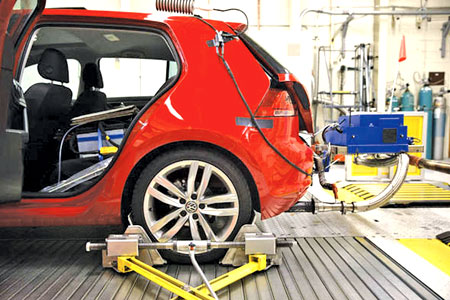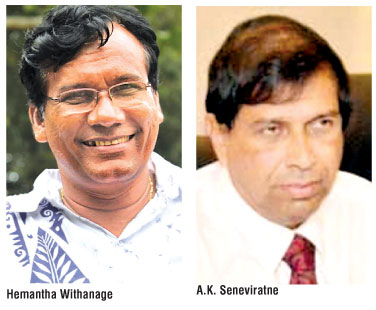
 The budget proposal to introduce Carbon Tax for carbon fuel run motor vehicles has created confusion among vehicle owners, and among environmentalists, as to whether the new tax is really meant to mitigate environmental damage caused by carbon emission by motor vehicles, since there is no clarity in the budget proposal how the new tax would be imposed on vehicle owners and how it would be utilized to mitigate environmental damage.
The budget proposal to introduce Carbon Tax for carbon fuel run motor vehicles has created confusion among vehicle owners, and among environmentalists, as to whether the new tax is really meant to mitigate environmental damage caused by carbon emission by motor vehicles, since there is no clarity in the budget proposal how the new tax would be imposed on vehicle owners and how it would be utilized to mitigate environmental damage.
Even the Motor Traffic Department, which has been proposed as the collecting agency of the new tax, is completely in the dark as they have not yet been properly informed about this tax, proposed in Budget 2017.
The Department is only aware that such a tax would be introduced, as the budget proposals have mentioned that a Carbon Tax will be introduced for all carbon fuel run motor vehicles, and the Motor Traffic Department will be the collecting authority of this newly introduced Tax.
According to the proposal, the cost of the emission test, which is mandatory every year to obtain revenue licence, will be reimbursed to the service provider by the Department. The vehicle owners need not pay an additional fee for the emission test.
Since there is a lack of clarity about the new tax, vehicle owners are confused and fear they would have to go through a complicated procedure when getting the vehicle emission test done, which is mandatory, to obtain revenue licence.
Explaining the background of the Carbon Tax, ,Director General of the Department of Fiscal Policy, A.K. Seneviratne said, the procedures and rates on the Carbon Tax has not been finalized yet, and the public will be informed about the new tax as soon as the procedures and rates are finalized.
“The budget proposal is aimed at streamlining the process of collecting the environment tax, (which is now collected through private firms) and remitting it directly to the Treasury through the Department of Motor Traffic”, Seneviratne added.
He said, despite the introduction of the new tax, the present emission test will be continued, but there is no necessity to pay for the emission tax separately. The fee for the emission test will be included in the carbon tax.
“When the carbon tax is paid the emission test fee is included in the carbon tax. Vehicle owners have to pay the carbon tax to a bank account, which is to be announced by the Department of Motor Traffic, and the bank slip should be submitted to the emission testing points, to get the tests done.
According to the new system, vehicle owners have to submit the carbon tax payment slip plus the emission test certificate to get the revenue licence. A mechanism will be introduced to reimburse the emission test fee to the operators, later.
According to Seneviratne, the carbon tax will be higher than the emission test fee because it is a new tax.
“For instance, where the emission test fee for a motorbike is Rs.400, the carbon tax will be around Rs.600. The three wheelers would have to pay around Rs.700 as carbon tax. However, the rates for each vehicle has not yet been finalized”, he added.
 All carbon fuel run vehicles will be liable to pay this tax, irrespective of the fuel efficiency of the vehicle. Only electric vehicles, which are not using carbon fuel, and tractors, will be exempted from this tax.
All carbon fuel run vehicles will be liable to pay this tax, irrespective of the fuel efficiency of the vehicle. Only electric vehicles, which are not using carbon fuel, and tractors, will be exempted from this tax.
“Even hybrid vehicles will be subjected to this tax, irrespective of the level of carbon emission from such vehicles. Our policy is to levy this tax on all vehicles using carbon emitting fuels”, he added.
Asked whether this system would make the present system of obtaining revenue licences more complicated, Seneviratne said, the new system will streamline the process of remitting the emission test fee directly to the Treasury. According to the present practice, vehicle emission testing agents channel only a percentage of the fee to the government.
Seneviratne, said, this tax however, has to be implemented after bringing an amendment to the existing laws.
“We have to first consider whether the new tax is to be introduced under the Motor Traffic Act or the Finance Act. I believe there are provisions now under the Motor Traffic Act to impose this tax. In the circumstances, there is no possibility to implement this proposal from January 1 2017, and it can be expected probably from April 1”, he added.
The Government expects a Rs. 4 billion revenue from this. But, nearly half of that revenue has to be reimbursed to the emission testing operators. So, the net revenue from the tax would be around Rs.2 billion, Seneviratne added.
“This is not targeted to increase the revenue, but to address environmental concerns”, he added.
He pointed out that there may be a lot of practical issues that have to be addressed before imposing the new tax, as there may be instances where vehicles are not maintained up to the standard level and thereby fail the test.
“If a vehicle fails to pass the emission test, the issue is, whether they have to pay the carbon tax again. If they fail the test, emission test operators cannot charge a fee for the second test. But, on the other hand, if any vehicle fails the test, it means it has to pay a penalty for not maintaining the carbon emission level up to the required standard ”, he added.
He said, these issues will be discussed in detail with the relevant agencies before implementing the proposal.
Commissioner General, Motor Traffic, Jagath Chandrasiri, said, the Department is yet to get instructions from the Treasury with regard to the new tax. The two vehicle emission testing service providers, Drivegreen and Laugfs Ecosri are yet to be informed about the new procedure.
K.K.P. Prabath, Accountant of Drivegreen Vehicle Emission Testing Service said, they have not been consulted with regard to the budget proposal and not yet officially informed about this decision.
W.K.H. Wegapitiya, Chairman, Laugfs Group, the operator of Laugfs Ecosri emission testing service was not available for comment.
Hemantha Withanage, Executive Director, Centre for Environment Justice, when asked for comments on the Carbon Tax said, he was not sure the new tax would be implemented here, in Sri Lanka.
“It is a sort of climate mitigation concept in other countries. They put the carbon tax to reduce the burning of fossil fuels. Vehicles burning more fuel are charged a higher carbon tax while the hybrids and other fuel efficient vehicles are charged a lower rate”, he added.
“I think it is good type of tool if they do it properly. But, where the carbon tax would end up is a question. If they put the money into the national budget and utilise it for any other Ministry, it is not worth it. If the carbon tax is utilized to improve the transport sector, to reduce carbon emission or invest for metro railway system, mono railway or electrified rail system, it would be beneficial. We have to understand how the money would be invested and how they calculate the carbon tax”, Withanage added.
However, he said, it is a global commitment of Sri Lanka, to the Paris Declaration. If the Government puts the tax in a separate account or trust fund and use it for environmental conservation or mitigation of climate, it would be very useful, he added.
Ishara Munasinghe, a vehicle owner speaking to the Sunday Observer said, they are confused about the new tax, since there are no details about it. “There is no issue about the tax. It has to be levied to protect the environment, but if things get complicated, it will be a worry for the people as they already have to spend a lot of time to pay taxes and other fees”, he added.
